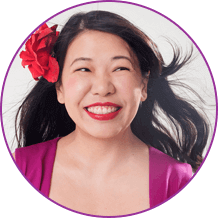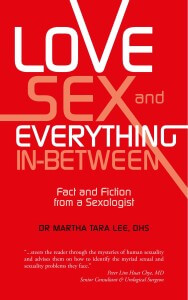Why is sex still a taboo subject in our society? Meet Dr Martha Lee. She is a highly sought-after and respected sex expert in Singapore, holding a Doctorate in Human Sexuality and a Masters in Counseling. In this episode, she shares her journey of pioneering positive conversations around love, relationships, and sexuality. From addressing taboo topics to empowering individuals to embrace their sexuality, Dr. Martha emphasises the importance of self-love and communication in building fulfilling relationships. Tune in now!
Discussion Topics: How to have the best sex of your life
- Introducing Dr. Martha Lee’s work and background
- What are the challenges she faced as a trailblazer in discussing sexuality?
- How do Dr. Martha’s workshops work and which kind of people participate in it?
- Is sharing personal experiences necessary for workshop participants?
- How early should we give sex education to children?
- What are some common issues in relationships, including sexual inhibition and vaginismus
- How is pornography negatively impacting sexual experiences and relationships?
- Why is self-love and communication so important in building fulfilling relationships?
Transcript: How to have the best sex of your life
Yana: Welcome to another episode of YanaTV. Today, our guest is Dr. Marta Lee, who is a relationship counselor and clinical sexologist. And given that we just have celebrated St. Valentine’s, the day of love, we thought it’s a perfect guest to talk about love, relationship, and sexuality. So thank you, Dr. Marta, for joining us today.
Dr Martha: Thank you for having me.
Yana: It’s such a fascinating topic and I find it particularly fascinating in Asia and out of Asia, especially in Singapore. And I know that you’re the pioneer in this field, a woman who was talking about the importance of, relationships and sexuality way before anyone else was doing it here. How does it feel to be a, the trailblazer?
Dr Martha: I didn’t set out to be a trailblazer. I was just unhappy that sex was not talked about in meaningful ways. We will talk about like tips, tricks, and techniques. To snare the person and then we talk about all the dangers and the shadow side of sexuality, but we never really talk about it in positive, wonderful, amazing, how sex is sacred. And so I just got angry and I wanted to hold space for anybody who has any kind of sexuality challenges,
Yana: And that was about 10, 15 years ago.
Dr Martha: Yes, 15 years. It has been difficult. In the last few years, there are more practitioners coming forward, which is a good thing because our climate in Singapore is changing. We are very well educated and informed. We are very plugged into what’s happening. The world as we know it is changing with the younger generation.
Yana: When you started, I’m just curious how did your family react that’s gonna be your profession?
Dr Martha: I don’t think my parents really, truly understood at first. they just thought I should just work for somebody and just have a stable job. So it wasn’t something that I even brought up to them to discuss. It was more like, I’m not asking you, I’m telling you this is what I’m going to do. It’s my life, I feel like it’s really important to not have any regrets, especially something as serious as your career choice. For me, it has to be something you’re passionate about so that you can do your best and hopefully make your mark in the field.
Yana: I know that over 15 years, you worked with a lot of people and you have seen many couples who come and talk about their relationship and their sexual relationship, trying to figure out how to make it all work. And it’s still such a big taboo topic in Singapore and in Asia in general. So how was the reaction of people actually, when you started having conversations about.
Dr Martha: It’s not easy because when I first started, I was the only one running sexuality related workshops and I would have workshops where there would be people who are more talkative and open and then there would be people who just sit there and just glare at me and just not want to say anything.
So for me, it’s really about just letting people be who they are and focusing on what is it that they are here to learn and just filling in the gaps being the butt of the jokes, talking about my personal life so that there’s some kind of a modeling that’s taking place because if they’re not sharing, then somebody needs to share. So I would share about my experiences so that I can support them in their lives. So it’s not really about oversharing or it’s not really about it being about me, but it’s really just to support them.
Yana: I understand. I’m what would be the ethnicity there? Asians, Westerners, more Asians, more Westerners,
Dr Martha: it’s quite diverse. It’s really diverse. So it’s just anybody who wants to come. diverse cultures, races, ages. So it’s really fascinating.
Yana: And is it like more men or women who would
Dr Martha: Yeah that’s the thing. When I run workshops that are open to the public men or women, there are women who are like, there are men there, so I’m not coming. So I have often found that when you have same sex workshops, It becomes a bit of a male bashing, which I really don’t like.
For many years now I’ve made it such that my workshops are open to people of all genders and sexual orientation, because that to me is a space where not only can you come and learn, but also hear from other people and start to have different perspectives on what really is life because if you’re in your own little bubble and you want to stay in your own little bubble, you’ll never really understand that there are beautiful people who are here to learn and who are wounded and we need to create such opportunities for us to learn. So now there are people who say, oh, we are not here for the workshop. We are here for the other people.
Which I love because somehow it’s like they put the trainer on some kind of a pedestal and yeah, we don’t want to hear from you, what do you know? Everything. So they want to hear from other people and that keeps it real.
Yana: So I really like that guess also when other participants are sharing, it becomes more relatable, right? Other than just you, who they see as an expert, of course, shares something. And again, it’s a topic mainly not comfortable to talk about. So when the neighbor shares, then the person goes, maybe I can also
Dr Martha: can also share.
Yana: So it gives more permission.
Dr Martha: Yes, and also to normalize. To see that, actually I think I’m alone, but actually there are several people in this room who have similar stories. when it comes to our personal life, often we don’t share about our personal life. So we don’t have that, that, that reality check of actually it’s me. It’s happening to a lot of people and it’s so common.
Yana: I understand that. What do you feel may be some of the most common issues that you just experienced since you started teaching, that people are having in the relationship, in their marriages? So what would be the issues?
Dr Martha: So I’ve been in practice for 15 years. I work with individuals, couples, men, women. I do have a lot of heterosexual clients. So what I see a lot in my work is sexual inhibition. And what does it mean, so it means people who are very uncomfortable around sex.
Whether it’s to talk about it or communicate, whether it’s with different sex positions, or different sex techniques, or they have certain hang ups, like for oral sex or sex toys. And, people with inhibition especially around vaginismus which is a condition that happens when the vagina shuts down, making penetration difficult or impossible.
So I work with a lot of people who cannot consummate their marriage. I work with people who are really conservative and of course people of different cultures and religions. Contrary to what a lot of people assume of the younger generation, there are actually still a lot of people who choose to wait until marriage to have sex.
And by shutting down their sexuality until marriage, a lot of them are quite disconnected from their body. They don’t know how to have sex. And this is where my support comes in I also work with people with penises, with issues around premature ejaculation, erectile difficulties, delayed ejaculation, people with low sex drive, people who want to navigate like King or polyamory opening up their relationships.
So basically it’s the whole spectrum of anything sex related. But the bottom line is supporting them so that they can, first of all, love and accept themselves and then be able to then support them with resources. Sometimes we do role play, and sometimes give them home assignments to do. But, one of the biggest things that I see in a lot of people is because of the lack of positive sexual conversations, they don’t talk about it with their friends, they don’t talk about it with their partner, they don’t know who to talk to. They are inhibited and because they don’t know what they don’t know. So that’s this phenomenon of the Asian starfish, you just lie there like a starfish.
But it’s very interesting since we are, talking about Asia and Asians how we are always very respectful of our elders, how we are told to shut up how we are trained to people, please. This becomes very problematic in the bedroom, where a lot of people are just suffering from a lack of pleasure or even pain, and not being able to articulate themselves.
So this is very much a cultural phenomenon for Asians, myself included. But I’ve also had to learn to speak up in the bedroom and realize that as much as I think that I have gotten better, there’s still a lot for me also to learn how to be assertive in my life.
But I want to say something in defense of starfish or starfish a lot of people say oh, they are just boring They just lie there They just expect to be serviced But a lot of people lie there because they are overwhelmed.They don’t know what they are supposed to feel Sex is new Sex is scary, sex is uncomfortable, and so we need to understand that a lot of doing the same old things and a lot of inability to express ourselves comes from the fact that they are just unsure. We need to have some compassion for people.
Yana: I love how casually you’re talking about all of that.
Dr Martha: It’s what I do for a living. Like from morning to night, it’s just all about sex. Read about sex, live, eat, breathe sex. I just find my work really interesting. In one day I could, let’s say, if I have a full day of clients, let’s say 7 or 8 clients and each one of them will be presenting totally different issues. So I love what I do.
Yana: I can see that. So do you feel that there is a lack of education? Do you think that in general people need to be educated more? And if yes, from what age do you start educating?
Dr Martha: Yes, so I am happy that in Singapore, we do have some form of sexuality education growing up. For me, there was none. So I’m happy that the younger generation do have some of it, although it is very much more abstinence based. And there are many different kinds of sex positive events that are starting to come out in Singapore in the last five years.
People are a lot more open with virtual events. When I’m also the sexologist for Singapore Cancer Society. So during COVID, we did virtual events and participation was just like. over the roof. Sometimes when I give a talk, I will have one or two questions, and it’s hard to get anybody to say anything. But when it’s Zoom, I have 30
Yana: Because they can just type anonymous, right? And no one knows who asked what.
Dr Martha: Because they can private message me, they can turn off their video, and then it gets real. And I just love that, like for my topic, like virtual events are really positive. And last year I started to train other counselors who are also interested in this topic of sexuality.
I’ve been doing this for coming, like this year, 15 years, and I’m tired and there needs to be more people and more avenues for people to get support. The family service centers they do have social workers. They do have counselors, but none of them are trained in sexuality. None of them. So when clients come to me and say, Oh, you’re very expensive. Where can I go? I don’t really know where to send them.
Yana: That’s why you’re training your people. I understand and also, again, mental health which was also, again, just not so hot topic, but it was very important and not very addressed topic until COVID came. So now I feel everyone talks about mental health. So I have a strong feeling that anything related to relationship and sexuality is going to be the next wave in the development of the society in this part of the world. It is definitely coming.
Dr Martha: Exactly.
Yana: And I’m just curious, So like we can start to help each other and maybe within the family, our children to just be more comfortable and understand themselves more and also have clear boundaries, know the language, right? Assert themselves. So many cases for women when they would agree into something, not because they want, but because they don’t know how to say no,
Dr Martha: Yes. So yeah, just now you were asking what age should they start, it really should be when they are born. I think people just don’t realize that a child is able to give feedback, even if they are non verbal. They, whether they are comfortable with being touched in a certain way, whether you’re rough handling them, like just tell them that you’re going to change their diaper,
Yana: know, they can tell. Communicate,
Dr Martha: That this is my body and you are asking for permission before you touch me. And like the parts of the genitals, like given the proper names. It doesn’t have to be this big thing. A lot of parents don’t talk about sexuality education with their kids because they do not know how to do it. I particularly in Asian families.
Yana: When there’s a lack of information, because when we’re not fully informed, then it leads to assumptions. It sometimes leads to addictions and overstimulation. It leads to violence. Sometimes people don’t understand how to handle it or leads to shut down said.
Dr Martha: I think it’s not really about what to do only, but also if you’re the parent, wouldn’t you want to impart some of your values? Or some of your positive attitudes around sex and sexuality. I remember when I was able to speak, I think I was three, I asked my mum one day tell me if sex is something I can look forward to when I grow up.
Oh, to her credit, my mum didn’t smack me or tell me to shut up, she just smiled. So it gave me a lot of hope, like these kind of things, right? Like little teachable moments to actually let your child know being an adult is not something that is awful and scary and like dangerous and it’s just about work and bills.
Yana: There’s also some fun to that. Yes, I understand so adults, right? So when we talk about adult relationships being in the relationships. So I’m just wondering if you just look in your mind against some of the probably like a most common problem, let’s say maybe women or men would come and when we can address if you and say, if you’re experiencing this in your relationship, maybe you can do these, this and that, or focus on these, this and that with women maybe shyness and maybe an ability to communicate or set boundaries or even express what you like, what you don’t like.
Dr Martha: Yes, that’s a very good question. I think a lot of us struggle with it, including myself. When I started being sexual, I didn’t realize it was so difficult for me to speak out in the bedroom. I would literally be frozen and the words would just not come out of my mouth. And so what I, what is important to do is to practice this in your own time in your own way. You could practice with a friend and Say hey, I want to have this conversation with my partner I don’t know how to say this.
Can I practice with you? You pretend to be my partner and then See how that sounds you can give me some feedback so you can practice with your friends write it down Maybe you have three points that you want to cover and then you can maybe rehearse with a friend but know that this awkwardness, shyness around sex is not uncommon. So it’s really about accepting yourself and not dismissing your needs.
Yana: Okay. Got that. Let’s say since we’re on a women topic, right? A female body, a pain is another big one. So many women don’t want it, don’t like it because they experience pain and they don’t know why. And they are generally healthy and there’s no explanation. And you’re too, it’s too embarrassing to ask mom about this. And maybe friends don’t know also what to say. So maybe most common reasons why a woman would be experiencing pain and what she can do
Dr Martha: So painful sex is so common. When being sexual, I don’t know anybody who has not had pain. So it took me a long time to realize this because now I’m sharing about myself for a very long time. Every single time I would feel pain. I would tell my partner, slow down softer, softer. After telling my partner ten times softer, I just give up. I just you know what? Obviously I’m telling you and it’s not working and you’re not listening to me. Fine, you just do whatever you want then. Then it’s starfish and then I’m just the starfish and then I’m just I just had so much rage inside me because it’s like you’re doing things to me, I’m telling you and you’re not listening.
I had so much rage and then I went to sex school for training and one day it just dawned on me the reason why they were doing that to me. Because somebody in a, let’s say you are in a heterosexual relationship, somebody in a male body actually experiences sensation differently from somebody in a female body.
Meaning people in female bodies are 30 per cent more sensitive because our skin is thinner. So I would have all these cisgender heterosexual partners Doing what they were doing onto themselves onto me and thinking that’s what works for them and it should work for me And then there’s also that shaming.
Oh, it works for my other partner. Why doesn’t it work with you? So there’s this comparison and there’s that element of the reason why they would shame you in the first place is because they do not know what else to do. They don’t have this wide repertoire of sexual skills. And so if something doesn’t work with then, something
Yana: is wrong with you, not with
Dr Martha: Yeah, there’s something wrong with you. So they’re not registering that we are actually experiencing the world and sensation differently from them because they are looking at life through their lenses and rightly all of us look at life through our lenses. So when you live in a life of privilege, you will not be able to understand or empathize as well with our LGBTQIA friends or people who are just looking at the world differently, which is why it’s so important for us to have different kinds of friends and to be open to understanding that we have our biasness and we have our privilege that maybe we don’t realize.
Yana: Absolutely. And basically, just listening to you, I could say that then like Overall, general advice would be that for men, just be a bit more gentle with women. So just check with your partner, check with your partner in a female body if it’s okay or not. And maybe the intensity that you know that guys want is not always what women want. This is actually also a conversation that sometimes I hear from the girls when they say that they just want, I don’t know, three hours foreplay and their husband wants something entirely different.
Dr Martha: I do hear this from heterosexual men that, the assumption that, if I last longer, then it means that she’s happier, which means that she will enjoy it, which means she will want more sex. And I was like, these are just. There are several different things which you are just making an assumption of. Just because it’s longer doesn’t mean it’s better. It’s not about the quantity, it’s also about the quality, it’s about the presence, it’s about the emotional connection, it’s about the love, it’s about the afterplay. So many things to unpack with them.
Yana: Since we now move to the topic about men, right? the most common problem probably for guys would be when it is premature ejaculation, right? And again, it’s also topic that very shameful often to talk about it. And also you don’t know who to say and what help to receive.
Dr Martha: There are a lot of misconceptions out there about how long sex should be, how often. So really penetration is usually about four to five minutes. Seven minutes if lucky, but really a lot of people are thinking they are supposed to last 30 minutes, like a porn star. A lot of them are having a lot of labeling of themselves, calling themselves porn addicts or sex addicts when in reality they are not. So these terms are being thrown around very frivolously and causing a lot of harm to people in male bodies.
So yeah another interesting thing about Asians is that actually Asian men they are more likely to have premature ejaculation, not because they are not trying, but because Asians actually in general do have more sensitive bodies caveman time, like If you lasted long, that meant you’re going to be eaten by some bear or something, right? So actually it’s a survival thing. So it was a good thing to be able to ejaculate quickly.
Yana: You couldn’t, you could run away from the bear.
Dr Martha: Run away from the bears. But it’s true. So yes, we are more sensitive as Asians
Yana: just a few like important aspects like pornography, which is huge. And again, since we’re on the topic of men, I think statistically, men are the one who watch it more than women. And usually they get access to this from a very young age. You can Google anything these days, So pornography is a big thing. And from what I know, it’s one of the things that it does for a man. It destimulizes mind, right? So it means that then the men would need more stimulation and actually it creates the opposite effect. Then it is much harder for them to come.
Dr Martha: So this is such a big topic. So what happens is a lot of, people they masturbate to porn because they are really just trying to help themselves to get excited so that they can orgasm, so that they can just finish the deed. So basically get it over and done with quickly. So the visual stimulus is something to help them and really there’s not enough sex education for them to know what are the alternatives. There’s not enough for them to know if I don’t watch porn, then what do I do?
Yana: Why do you do this?
Dr Martha: So instead of shaming them, realize that there was no information around the alternatives. So there’s such a thing called mindful masturbation. So there’s visual stimulation, I call it. Then there’s the mental stimulation, where you are thinking and fantasizing, which means you are working much harder using your mind.
To imagine and then that’s what I call the physical stimulation, which is mindful masturbation So no thinking no watching and just being in your body So that by itself is challenging and it can be a good way for people to practice presence Because if you are stimulated and maybe you’re used to the stimulation You can find that oh i’m just used to like getting it over and done with in five minutes Why do I want to go into this?
50 minute, 30 minute thing with my partner, and then I have to make sure they’re okay, and they don’t have pain, and blah, blah, blah, blah. Yes, too much work. I do have several clients who actually prefer to have this rich inner world of masturbation, and actually neglect their partner, which then is problematic when you’re in a relationship.
Like you said, a lot of them, they are used to visual stimulation, there are some people who, want to do something more exciting. Like they start to go to like chats or as in telegram with the Nazi Nomad people like exchanging pictures and this violating people’s consent and boundaries and of course be totally illegal as well.
Yana: So things like that do happen to the couples again. And maybe that’s gonna be then the final question for today. So when we look at the relationships um, what do you feel is fundamentally is the most important secret to have a very high field relationship and to really healthy sexuality?
Dr Martha: Don’t lose your sense of self when you’re in a relationship. I think it’s all very romantic to say that you love someone, you want to take care of them. You keep them top of mind, but when you lose your sense of self, your own sense of mission and your purpose, then you actually start to lose your magnetism and your attractiveness.
So I think regardless of what kind of relationship dynamics. that you are in is really important to fundamentally still have a relationship with yourself and love yourself so that you continue to use that as like a temperature check of what is working for you or not. I feel it’s the best and most important thing we can all do for ourselves.
Yana: Thank you so much. That was a very 18 plus hard in depth conversation about highly controversial subject in Singapore. And so I just appreciate your honesty and your courage to come and share with us in the studio.
It was definitely also highly informative. I also learned a few things. Okay. I’m going to check it when I go back home. So thank you, Dr. Martha. So that was Dr. Martha with us today in the studio. And it was a really interesting conversation about their relationship. And I love this idea where you are your most important partner. And it’s so important that you keep checking in with yourself, whether you are happy in the connection with another person. And so just remember that loving yourself is the fundamentals of any relating. Thank you for tuning in today. We are very grateful to Muse studio for hosting here on the TV.
About Dr. Martha Tara Lee
Surrounded by friends who were sexually inhibited and struck by dire lack of positive conversations around sex and sexuality in Singapore, Dr. Martha Tara Lee set out to make a positive difference in embarking on her doctorate in human sexuality before launching Eros Coaching in 2009. Today, she remains dedicated to working with individuals and couples who wish to lead self-actualised and pleasure-filled lives.
She also holds certificates in counselling, coaching and sex therapy, and her fourth degree – a Masters in Counselling in May 2018. In practice since 2009, she is the only certified sexuality educator and certified sexuality educator supervisor by the American Association of Sexuality Educators, Counselors and Therapists (AASECT) in Singapore.
Often cited in the media, Dr. Lee is the appointed Clinical Sexologist for Singapore Cancer Society. She was recognised as one of ‘Top 50 Inspiring Women Under 40′ by Her World in July 2010, and one of ‘Top 100 Inspiring Women’ by CozyCot in March 2011. She has published four books: Love, Sex and Everything In-Between, Orgasmic Yoga, From Princess to Queen and {Un}Inhibited.
Martha works with individuals and couples in private coaching sessions, and conducts her own workshops. She takes prides in making sure all her workshops are also fun, educational, and sex-positive. This comes easily to her because even though she is extremely dedicated and serious about her work, she fundamentally believes that sex is meant to be fun, wonderful, amazing and sacred. As such, this serious light-heartedness has shone through again and again. For her full profile, click here. Email her here.








